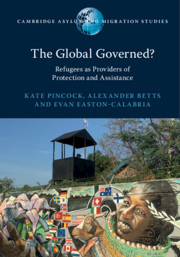6 - Kakuma
Published online by Cambridge University Press: 06 March 2020
Summary
In Kakuma, UNHCR expects RCOs to compete in a ‘market’ for social protection: either they must provide services for which the community pays, or they can compete to partner with implementing partners (IPs). This chapter explores how the endemic market-based logic of Kakuma has shaped the landscape of refugee-led protection and assistance. UNHCR encourages RCOs, as it is reluctant to interfere with the market. The result is that refugee CBOs face ‘struggle’. They need resources to develop capacity and competence, but cannot access those resources without first demonstrating the same qualities. Yet few RCOs can thrive in this marketplace. While around 30 RCOs have registered as CBOs in the regional administrative capital, Lodwar, and are members of Kakuma’s RCO umbrella organisation, most struggle for funding or recognition. Only one RCO, SAVIC, has its own building and external funding, established through chance encounters and a network of connections built over time by its founders.
Information
- Type
- Chapter
- Information
- The Global Governed?Refugees as Providers of Protection and Assistance, pp. 89 - 109Publisher: Cambridge University PressPrint publication year: 2020
Accessibility standard: Unknown
Why this information is here
This section outlines the accessibility features of this content - including support for screen readers, full keyboard navigation and high-contrast display options. This may not be relevant for you.Accessibility Information
- 1
- Cited by
